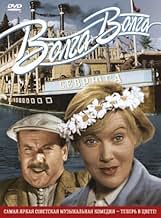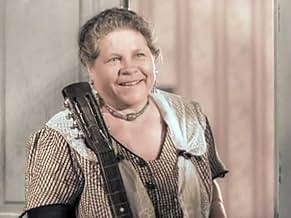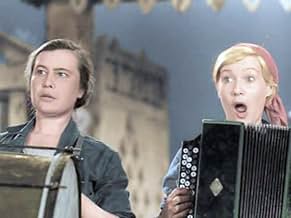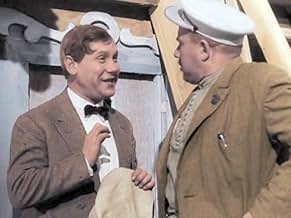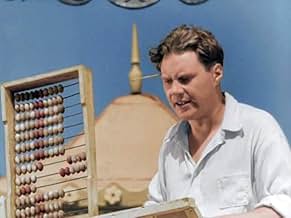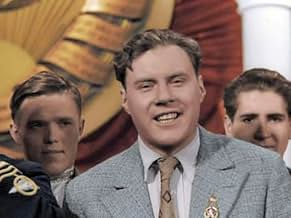IMDb-BEWERTUNG
6,6/10
831
IHRE BEWERTUNG
Die Reise zweier Künstlergruppen über die Wolga in die Hauptstadt wird zu einem gefährlichen und fesselnden Abenteuer. 1938Die Reise zweier Künstlergruppen über die Wolga in die Hauptstadt wird zu einem gefährlichen und fesselnden Abenteuer. 1938Die Reise zweier Künstlergruppen über die Wolga in die Hauptstadt wird zu einem gefährlichen und fesselnden Abenteuer. 1938
- Auszeichnungen
- 1 wins total
Anatoli Shalayev
- The Boy Musical Prodigy
- (as Tolya Shalayev)
Mariya Mironova
- The Secretary
- (as M. V. Mironova)
Nikita Kondratyev
- The Waiter
- (as N. S. Kondratyev)
Vsevolod Sanaev
- The Lumberjack
- (as V. V. Sanayev)
Alexei Dolinin
- The Militia Man
- (as A. G. Dolinin)
Ivan Chuvelyov
- The Olympiad Representative
- (as I. P. Chuvelyov)
Nikolai Khryashchikov
- Appearing
- (Nicht genannt)
Yakov Rykov
- Tugboat captain
- (Nicht genannt)
Lidiya Vinogradova
- Amateur Performer
- (Nicht genannt)
Empfohlene Bewertungen
Allegedly, this was Joseph Stalin's favourite film, and it may be interesting to see for oneself what amused one of the sickest minds in history. Apart from that historical aspect, this film has no basis in reality, moreover, it never did. While millions of Russian citizens were being sent to concentration camps for no reason except suspicion of treason (whatever that meant), this film depicts life in the Imaginary Soviet Union, where people live happy and carefree lives. A good example of how Soviet propaganda worked itself out in the Russian cinema. Aesthetically, there are many good Russian -- even Soviet -- films. However,this one isn't one of them.
When Stalin ordered Alexandrov to make this movie, he said he only wanted to see the happy images of the simple rural people along the river Volga. One could say, Stalin wanted something that would prove to him his people are happy (even if he ordered others to lie to him to make the appearance of happiness). There's no real story or plot, there's just a number of folk dances and rituals thrown together in order to entertain. It's kitch that served only one purpose - to make a dictator happy. I wouldn't even classify this movie as a comedy, it's simply a musical, or better yet a recorded account of folk dancing and singing with some attempts to moderate the time in between the musical sequences. Thus you should not even look for the depth of the characters or the story. Were it made that way Alexandrov might have even been shot! This film could not afford to be critical. IT was made in an era of Soviet history when one could not express one's self as an artist, but had to do what the propaganda machine demanded of him.
Selfish uncommitted bureaucrat Ivan Ivanovich Byvalov (who looks like Mario Bros!) is the most interesting element in this very light-hearted slaptstick musical comedy by Grigori Aleksandrov, who also directed 11 years before October: Ten Days that Shocked the World. Volga-Volga has some curious background stories, such as the title coming from a jokingly suggestion by Charlie Chaplin when he and Aleksandrov were rowing together in the United States and the British filmmaker heard those words in the lyrics of a folk song sang by the Soviet. Another very curious story is that Volga-Volga is claimed to be the favorite movie by Joseph Stalin, what is particularly surprising, as there are many funny gags about things that did not work in URSS! The raft soon got bogged down, all local boats were broken and still being repaired, the mare for transportation lacked horshoes, the balalaikas crafted in the factory had the worst sound quality ever heard, and the telephone calls were absolutely unintelligible (additionally, the trip over the river eventually happens in a steamboat which is said that was gifted 30 years before by the United States, and all its only problem were originated by bad maintanance!). Besides all that, Byvalov was the archetypical ambitious bureaucrat who had no concern about the quality of the works he supervised, and his only interest was to reach the most important office, and closest to Moscow, possible. It is mentioned in the beginning of the film that Byvalov moved to another institution to work, getting closer and closer to Moscow, 20 times just in the last five years! He was only two weeks managing the balalaika craft factory but was already waiting for a call to a new job! Did Stalin identify himself with the character or was his vanity what made him like that his name was given to the steamboat of the trip from the Great Volga habour to Moscow?! As a matter of fact, the silly song in the very last minute of the movie says bureaucrats like Byvalov were rare an represented "the old years", in a laughable attempt to score some brownie points from the regime... Besides Byvalov's background and the mockery on production dysfunctionalities, another interesting element in the beginning of the movie is the brief change from romantic idealization to fierce anger between the couple who had opposite views on music: the man loved classic music and rhe woman liked folk one. That romantic comedy element endures throughout the film, until the predictable happy end. Before the steamboat trip, there is an eight-minute collective artistic presentation of the whole village to a frightened Byvalov that is awesome, very amusing and well done, perhaps onde of the nicest moments of the film, second only to the initial appearance of characters Byvalov and his sycophant assistant Zoya Ivanovna. Eventually, the story continues with a troublesome trip, musical team duels, a lot of rough-and-tumble, and misunderstandings. Overall, the film has ups and downs, some tepid moments and silly overacting, but also quite funny cartoonish musical slapstick and smart gags on Soviet life and society. While not a masterpiece from Soviet cinema, it is underrated and worth watching.
This 1938 musical comedy from the Soviet Union directed by Grigori Alexandrov has some fame as Stalin's favorite movie. He liked it so much he has it shown in his private screening room at the Kremlin to his Politburo colleagues scores of time. He repeatedly teased Khrushchev for his likeness to Byvalov, the humorless village bureaucrat played by Igor Ilinsky.
The movie opens with an amusing intro in which a catchy song mentions the main cast and the characters they play. Then it moves to a scene showing the two love interests of the film kissing in the mouth (the kiss is far more passionate than what most movies from the West would permit at the time). And then we go to the main story. In a country village along the Volga River, there is a friendly competition between a folk music band (led by the beautiful Lyubov Orlova) and a more conventional classical music outfit, which is led by her boyfriend, Alyosha (played by Andrei Tutyshkin). When in the village they heard there is a musical contest for country bands in Moscow, and despite the initial opposition of the bureaucrat, both bands take the river boat to reach the capital.
Naturally for a musical comedy, the finest thing in the film is the musical numbers. The best in my opinion comes around the middle when virtually all the village gets into playing different tunes to convince the bureaucrat that they have talent worthy of going to the contest in Moscow. The movie oozes nostalgia for the simple village life (in a time when the Soviet Union was rapidly urbanizing) and is also how the Soviet government has made life so much better than now villagers mostly has to worry not about surviving but about playing in music contests. Only towards the end the movie falls into the territory of heavy propaganda. The sympathy of Orlova helps (though sometimes she stretches it too far).
The movie opens with an amusing intro in which a catchy song mentions the main cast and the characters they play. Then it moves to a scene showing the two love interests of the film kissing in the mouth (the kiss is far more passionate than what most movies from the West would permit at the time). And then we go to the main story. In a country village along the Volga River, there is a friendly competition between a folk music band (led by the beautiful Lyubov Orlova) and a more conventional classical music outfit, which is led by her boyfriend, Alyosha (played by Andrei Tutyshkin). When in the village they heard there is a musical contest for country bands in Moscow, and despite the initial opposition of the bureaucrat, both bands take the river boat to reach the capital.
Naturally for a musical comedy, the finest thing in the film is the musical numbers. The best in my opinion comes around the middle when virtually all the village gets into playing different tunes to convince the bureaucrat that they have talent worthy of going to the contest in Moscow. The movie oozes nostalgia for the simple village life (in a time when the Soviet Union was rapidly urbanizing) and is also how the Soviet government has made life so much better than now villagers mostly has to worry not about surviving but about playing in music contests. Only towards the end the movie falls into the territory of heavy propaganda. The sympathy of Orlova helps (though sometimes she stretches it too far).
Even those of us with some sort of education in the field of cinema rarely get to see other Soviet films than those of Eisenstein, Tarkovskij and maybe Pudovkin. It´s easy for every western film fan to become as prejudiced as the bureaucrat Byvalov in Volga-Volga: "Talent? in this dump?" My point being, of course, that it would be unfair to world cinema as well as to oneself if one were to deny oneself the pleasures of at least once in a while seeing a Feuillade serial, a German mountain film or a Soviet musical. Volga-Volga is an excellent choice for the curious cinephile. As everyone points out, it has the distinction of reportedly being Stalin´s favourite film, it has stars in it is well as great music, I could go on and on. The main reason for seeing Volga-Volga is of course that it´s great fun. It had me in stitches more than once.
A comment on polart´s vhs edition of Volga-Volga: Granted, the subtitles are yellow and eminently readable, but they are also quite often badly timed and frequently seem insufficient. Also, the framing seems to be slightly off, something i´m hesitant in blaming comrades Alexandrov and Petrov for.
A comment on polart´s vhs edition of Volga-Volga: Granted, the subtitles are yellow and eminently readable, but they are also quite often badly timed and frequently seem insufficient. Also, the framing seems to be slightly off, something i´m hesitant in blaming comrades Alexandrov and Petrov for.
Wusstest du schon
- WissenswertesFamously, this was Joseph Stalin's favorite film and he would often show off how well he knew it by performing every part just before the actors on screen.
- VerbindungenFeatured in Komediya davno minuvshikh dney (1980)
Top-Auswahl
Melde dich zum Bewerten an und greife auf die Watchlist für personalisierte Empfehlungen zu.
Details
- Laufzeit1 Stunde 44 Minuten
- Farbe
- Sound-Mix
- Seitenverhältnis
- 1.37 : 1
Zu dieser Seite beitragen
Bearbeitung vorschlagen oder fehlenden Inhalt hinzufügen


